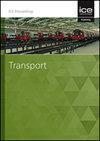Impact of COVID-19 restriction measures on transport sector in Sub-Saharan Africa: insights from Douala City, Cameroon
IF 1.2
4区 工程技术
Q4 ENGINEERING, CIVIL
Proceedings of the Institution of Civil Engineers-Transport
Pub Date : 2024-03-19
DOI:10.1680/jtran.23.00093
引用次数: 0
Abstract
The transportation industry plays an important role in shaping today's economy and society with a large impact on growth and development. However, the unprecedented outbreak of COVID-19 in 2020 and the prompt measures adopted by state governments to contain the spread of the virus drastically reduced services provided by transportation systems. A burgeoning literature is growing already in developed countries evaluating the effect of the pandemic on the transport sector and proposing sustainable measures to cope with future pandemics is underway. Conversely, there is nuanced understanding of the COVID-19 response to the urban transport sector in developing countries of Sub-Saharan Africa where urban population concentration and mobility patterns are at their peak. Though marred by scanty evidence to document and assess the situation in Sub-Saharan Africa, Cameroon represents a useful “study ground” to conduct such findings. Using Douala city in Cameroon as a case study, this paper examines the effect of COVID-19 restrictions on (i) mobility patterns, (ii) transport operators and (iii) to provide evidence-based recommendations to transport authorities in responding to future pandemics in the sub-continent. A sample of 190 key informants (taxi drivers, bus drivers and bike riders) were interviewed using questionnaires complemented by focus group discussions with relevant transport authorities notably transport agency operators, transport delegates, traffic police department and transport syndicate leaders. The key findings reveal a drastic decline in passenger demand for public transport during the pandemic period, a drastic reduction in bus/taxi occupancy leading to a steep decline in intra-urban and inter-urban mobility, and a drop in the income situation of bus and taxi drivers. Transport operators lay off workers at bus terminals stemming from low turnovers. The outcome pushes for policy options for extensive collaboration among various transport-related stakeholders, consultation and effective involvement of public transport operators in decision-making that may create sustainable pathways to cope future pandemic waves.COVID-19 限制措施对撒哈拉以南非洲运输部门的影响:喀麦隆杜阿拉市的启示
交通运输业在塑造当今的经济和社会方面发挥着重要作用,对增长和发展有着巨大影响。然而,2020 年爆发了史无前例的 COVID-19 大流行病,各州政府迅速采取措施遏制病毒传播,大大减少了运输系统提供的服务。在发达国家,已经有越来越多的文献在评估大流行病对交通部门的影响,并提出应对未来大流行病的可持续措施。与此相反,在撒哈拉以南非洲发展中国家,城市人口集中和流动模式正处于高峰期,对 COVID-19 对城市交通部门的影响有细微的了解。虽然记录和评估撒哈拉以南非洲情况的证据不足,但喀麦隆是进行此类研究的有益 "研究场"。本文以喀麦隆杜阿拉市为案例,研究了 COVID-19 限制措施对以下方面的影响:(i) 流动模式;(ii) 交通运营商;(iii) 为交通管理部门应对未来次大陆流行病提供基于证据的建议。研究人员使用调查问卷对 190 名主要信息提供者(出租车司机、公交车司机和自行车骑行者)进行了抽样调查,并与相关交通管理部门,特别是运输机构运营商、运输代表、交通警察局和运输集团领导人进行了重点小组讨论。主要调查结果显示,在大流行病期间,乘客对公共交通的需求急剧下降,公共汽车/出租车的乘坐率急剧下降,导致城市内和城市间的交通流量急剧下降,公共汽车和出租车司机的收入状况也有所下降。由于周转率低,交通运营商解雇了巴士总站的工人。研究结果推动了各种政策选择,以促进与交通有关的利益相关者之间的广泛合作、协商以及公共交通运营商对决策的有效参与,从而为应对未来的大流行病浪潮创造可持续的途径。
本文章由计算机程序翻译,如有差异,请以英文原文为准。
求助全文
约1分钟内获得全文
求助全文
来源期刊
CiteScore
2.60
自引率
0.00%
发文量
42
审稿时长
5 months
期刊介绍:
Transport is essential reading for those needing information on civil engineering developments across all areas of transport. This journal covers all aspects of planning, design, construction, maintenance and project management for the movement of goods and people.
Specific topics covered include: transport planning and policy, construction of infrastructure projects, traffic management, airports and highway pavement maintenance and performance and the economic and environmental aspects of urban and inter-urban transportation systems.

 求助内容:
求助内容: 应助结果提醒方式:
应助结果提醒方式:


